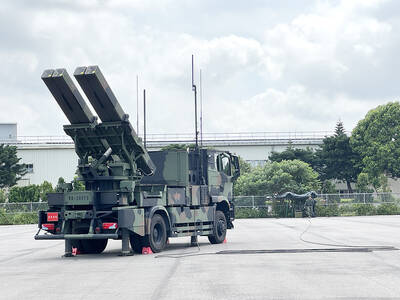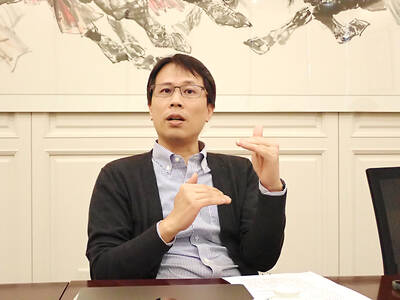Beijing is mass-posting videos featuring a false “secret history” of President Tsai Ing-wen (蔡英文) on hundreds of social media accounts in a disinformation push ahead of Saturday’s presidential election, sources said.
The Secret History of Tsai Ing-wen (蔡英文秘史) is a 300-page document containing rumors and negative content first published last month on the online open repository Zenodo.
The material is being turned into hastily produced videos with artificial intelligence (AI)-generated voiceovers and fake hosts, and being posted on YouTube, Instagram, X and other platforms, a national security official familiar with the matter said on condition of anonymity.

Photo: Screen grab from Austin Wang’s Facebook page
The content’s creation and spread bore the characteristic traits of an informational operation by the Chinese Ministry of State Security, the official said.
The videos, which were being shared about 100 times per minute, were promptly replaced if deleted by platforms or the accounts were banned and had been edited using Capcut, software developed by Chinese firm ByteDance Ltd (字節跳動), which owns Douyin, they said.
The videos used virtual hosts, including characters that resembled Chinese-speaking newscasters, foreigners, and in at least one instance, Santa Claus, they said.
However, the content did not generate high rates of engagement due to the low production quality, including the artificial appearance and voice of the virtual hosts, and the use of Chinese-language terms not commonly used by Taiwanese, the official said.
The campaign used more social media platforms than usual, including a manga subforum of the online bulletin board Professional Technology Temple, Mirror Literature and a Facebook group for real-estate listings, they said.
China is known to wage disinformation campaigns against leaders of democratic states, including one last year targeting Canadian Prime Minister Justin Trudeau, but the recent operation exceeded it in scale and resources, the official said.
Beijing is likely using Taiwan as a test bed for information warfare techniques that could be deployed against other countries while still damaging the Democratic Progressive Party at the ballot box on Saturday, the official said.
Austin Wang (王宏恩), an associate professor of political science at the University of Nevada, echoed the official’s assessment.
As of Tuesday, more than 100 nearly identical videos had been uploaded to YouTube since Sunday, Wang said.
The videos were mostly a recital by an AI-created virtual host of the same document and pictures chosen by an algorithm, he said, adding that all of the uploads had single-digit view counts.
The flood of videos suggests that Beijing has the ability to create the impression that the material is generating public interest, he said.
“There is no doubt this activity is coordinated and a show of force,” Wang said. “Its scale far exceeded anything we tracked before.”

The Philippines is working behind the scenes to enhance its defensive cooperation with Taiwan, the Washington Post said in a report published on Monday. “It would be hiding from the obvious to say that Taiwan’s security will not affect us,” Philippine Secretary of National Defense Gilbert Teodoro Jr told the paper in an interview on Thursday last week. Although there has been no formal change to the Philippines’ diplomatic stance on recognizing Taiwan, Manila is increasingly concerned about Chinese encroachment in the South China Sea, the report said. The number of Chinese vessels in the seas around the Philippines, as well as Chinese

URBAN COMBAT: FIM-92 Stinger shoulder-fired missiles from the US made a rare public appearance during early-morning drills simulating an invasion of the Taipei MRT The ongoing Han Kuang military exercises entered their sixth day yesterday, simulating repelling enemy landings in Penghu County, setting up fortifications in Tainan, laying mines in waters in Kaohsiung and conducting urban combat drills in Taipei. At 5am in Penghu — part of the exercise’s first combat zone — participating units responded to a simulated rapid enemy landing on beaches, combining infantry as well as armored personnel. First Combat Zone Commander Chen Chun-yuan (陳俊源) led the combined armed troops utilizing a variety of weapons systems. Wang Keng-sheng (王鏗勝), the commander in charge of the Penghu Defense Command’s mechanized battalion, said he would give

‘REALISTIC’ APPROACH: The ministry said all the exercises were scenario-based and unscripted to better prepare personnel for real threats and unexpected developments The army’s 21st Artillery Command conducted a short-range air defense drill in Taoyuan yesterday as part of the Han Kuang exercises, using the indigenous Sky Sword II (陸射劍二) missile system for the first time in the exercises. The armed forces have been conducting a series of live-fire and defense drills across multiple regions, simulating responses to a full-scale assault by Chinese forces, the Ministry of National Defense said. The Sky Sword II missile system was rapidly deployed and combat-ready within 15 minutes to defend Taiwan Taoyuan International Airport in a simulated attack, the ministry said. A three-person crew completed setup and

SHIFTING FOCUS: Investment in China fell due to increasing costs, the US-China trade war and China’s economic development slowdown, a spokesperson said The percentage of Taiwanese businesses investing in China has been steadily declining since 2010 due to increased costs, the US-China trade war and the slowdown of China’s economic development, Straits Exchange Foundation (SEF) spokesperson Li Pao-wen (黎寶文) said. In terms of Taiwan’s total outward investment, the percentage of businesses investing in China has dropped from 83.8 percent in 2010 to 11.4 percent in 2023, 7.5 percent last year and 2.7 percent in the first quarter of this year, Li said in an exclusive interview with Liberty Times, the Taipei Times’ sister paper. Li said that 70 percent of these businesses experienced
